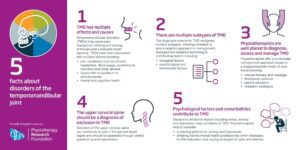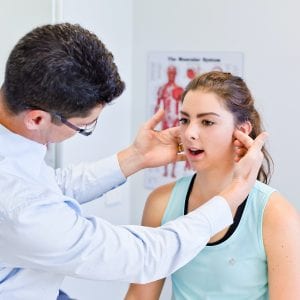Jaw Pain (TMJ)
Article by John Miller
What is Jaw Pain?
Jaw pain often stems from from dental issues such as a decaying tooth or infection, but a significant portion arise from temporomandibular joint dysfunction (TMD), which affects the muscles and joints controlling jaw movement. The discomfort can present as clicking, pain, stiffness, and restricted motion. Common causes include bite issues, stress, poor muscle movement patterns or injuries like a broken jaw. Addressing jaw pain early is essential to avoid long-term complications.
Read more: What is TMD? | How Physiotherapy Can Help Jaw Pain
Why Does Jaw Pain Occur?
Several factors can lead to jaw pain. Stress and teeth grinding (bruxism) frequently contribute to muscle tension and joint dysfunction. Other causes include jaw injuries, dental issues, or poor posture. For example, resting your head on your hand may strain your jaw muscles. Identifying the root cause is critical for effective treatment.
Read more: What Causes TMD?
How is Jaw Pain Diagnosed and Investigated?
Jaw pain requires a thorough assessment by healthcare professionals. Your dentist is the best pace to start investigating your dental health. A TMJ physiotherapist is involved in the opening and closing function of your jaw. That is, the movement components. You TMJ physio can evaluate muscle tension, jaw alignment through motion, and joint ranges. In some cases, imaging like X-rays or MRIs may be recommended. Early diagnosis helps prevent complications and improves treatment outcomes.
What are the Symptoms of Jaw Pain?
Symptoms of TMD can range from mild discomfort to severe pain. Common indicators include jaw clicking, locking, difficulty chewing or opening your mouth to eat an apple or burger, and facial pain. It’s crucial to monitor these symptoms, as they can lead to chronic degenerative jaw conditions if left untreated.
Solutions for Jaw Pain Relief
Dental interventions such as dental surgery, bite plates or orthodontic treatments might be recommended. Physiotherapy is a highly effective approach to treating jaw pain for clicking, locking and jawa that deviate when opening or closing. A TMJ physiotherapist may offer manual therapy, muscle relaxation techniques, dry needling or acupuncture, and exercises tailored to your specific condition. Regular treatment can help restore normal jaw function and relieve pain.
Jaw Pain Assessment by a TMJ Physiotherapist
Latest Research
Temporomandibular disorders (TMDs) involve various conditions affecting jaw structure and function, caused by multiple factors like muscular and joint issues or degeneration. This review analysed physiotherapy techniques for managing TMDs and compared their effectiveness. A systematic review of 656 articles led to 15 studies being included. The findings show that physiotherapy, particularly when combining therapeutic exercises and manual therapy, is effective in reducing symptoms like pain and improving function and quality of life in TMD patients. Physiotherapy is well-supported as a conservative treatment for TMDs (González-Sánchez et al., 2023).
Reference:
González-Sánchez, M., Cuenca-Martínez, F., Simón-Fernández, M. C., Gil-Martínez, A., & La Touche, R. (2023). Physiotherapy treatment for temporomandibular disorders: A systematic review. Journal of Oral Rehabilitation, 50(1), 25-36.
What to Do? Seek Professional Advice
If you’re suffering from jaw pain, it’s essential to seek help from your dentist or a jaw physiotherapist. A thorough assessment will help determine the best course of treatment, whether through manual therapy, exercises, or further dental evaluation. Early intervention can prevent long-term complications and improve your quality of life.
Rochedale - Call 38410277
Book Online: RochedaleSalisbury - Call 32751044
Book Online: SalisburySandgate - Call 32691122
Book Online: SandgateJaw Pain FAQs
- Why does my jaw hurt on one side? – This could be due to uneven teeth alignment, muscle strain, or TMJ dysfunction on one side.
- When should I be concerned about jaw pain? – If the pain persists for more than a week, interferes with eating or speaking, or is accompanied by severe symptoms like swelling.
- How do you relieve jaw pain? – Applying ice packs, avoiding hard foods, and performing gentle jaw exercises can help. Consult a physiotherapist for tailored advice.
- Why did I suddenly get TMJ? – Sudden onset can result from stress, jaw injury, or abruptly starting to clench or grind your teeth.
- Does TMJ go away on its own? – Mild cases might improve with self-care, but persistent or severe TMJ requires professional treatment.
- What are the 4 stages of TMJ? – The stages range from mild discomfort, clicking, chronic pain and joint dysfunction that can result in jaw locking.
- Why does my jaw hurt near my ear? – The TMJ is located just in front of the ear, and issues with it can cause pain that feels like it’s coming from near your ear.
- How do you release TMJ tension? – Techniques include jaw relaxation exercises, stress reduction, and using heat packs. Ask your TMJ physiotherapist for advice.
- Why does my jaw hurt but I don’t have a toothache? – Jaw pain without a toothache can still stem from TMJ issues, arthritis, or muscle strain.
- Can jaw pain fix itself? – Some minor jaw pain can resolve with rest and self-care, but persistent pain needs medical or dental attention.
- How long does one-sided jaw pain last? – This varies but seek help if it lasts more than a few days without improvement.
- What happens if jaw pain is left untreated? – Ignoring jaw pain can lead to worsening symptoms, increased discomfort, and possibly chronic conditions such as TMJ arthritis.
Related Articles
- TMJ Physiotherapy Guide Learn how TMJ physiotherapy can help manage jaw pain through specialised techniques and exercises.
- What Causes TMJ? Explore the common triggers of Temporomandibular Joint Dysfunction and how to prevent them.
- TMJ Headache Find out the symptoms associated with a TMJ Headache, plus treatment options.
- Jaw, Neck & Headache Conditions Understand how issues with the jaw can lead to neck pain and headaches.
- Tension Headache and TMJ: The Connection Read about how tension headaches can be linked to TMJ disorders and what treatments can help.
- Posture and TMJ: What’s the Link? See how poor posture can contribute to TMJ issues and learn corrective techniques.
- TMJ FAQs: Answers to Common Questions Gain insights into frequently asked questions about TMJ disorders and their implications.











